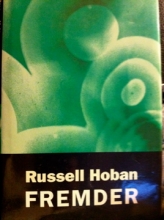Fremder (Novel, 1996)

Summary:
Fourth Galaxy, 4 November 2052: in the black sparkle of deep space a figure in a blue overall tumbles over and over as it drifts towards the planet Badr-al-Budur. No space suit, no helmet, no oxygen. He can't be alive, can he? But he is. First Navigator Fremder Gorn is the only survivor when the Corporation tanker Clever Daughter disappears. Nobody knows how he did it, and everybody, including Fremder himself, wants to know. Caroline Lovecraft, Head of the Physio/Psycho unit at Newton Centre, Hubble Straits finds that intimacy doesn't lead to answers and Fremder's own memories are resolutely obscure. Fremder's name means stranger, and his story, as one would expect from Russell Hoban, is full of strangeness and brilliant imagery.
Detailed description:
As Fremder opens, we see a figure in a blue coverall tumbling over and over as it comes toward us in the deep chill and darkness of the Fourth Galaxy. The striking thing about this figure is that it wears no space suit, no helmet, no oxygen. Just a man tumbling through frozen space, amazingly alive. The man turns out to be Fremder Gorn, the First Navigation Officer on the deep-space tanker Clever Daughter. On the morning of his thirtieth birthday, November 4, 2052, Fremder is the only survivor out of a crew of seven on board the Clever Daughter, which has mysteriously disappeared. Not surprisingly, the authorities want to know what happened. Unfortunately, Fremder either doesn't know himself, or isn't telling.
The fragmented, frightening future that Fremder introduces us to is one only Mr. Hoban could have dreamed up. It's a future in which the streets are owned by roving gangs called Shorties and Clowns, or Prongs and Arseholes, while "Class-A" citizens use locked elevated walkways to get around. A future in which robots wear the faces of Vermeer paintings, and humanity has mastered intergalactic travel due to the invention of "flicker drive."
Flicker Drive was inspired by the memoirs of film director Gösta Kraken (a Medusa Frequency character who puts in a flashback cameo here), and refined by Fremder's mother, the now-departed scientist Helen Gorn. As Fremder's narrative progresses, we learn that he never met his famous mother: she committed suicide when she was seven months pregnant with him, leaving a note for the sanatorium staff instructing them to name him Fremder Elijah Gorn. She left a note for Fremder, too: "Dear Fremder Elijah, I'm sorry that I'm not going to be around to be your mother but each of us can only go so far: I've gone my distance and now you'll have to go yours. Learn the speech of the ravens and they will feed you. Good luck, your mother, Helen Gorn."
It's only through diligent research that Fremder has managed to put together the pieces of his family history. How his grandfather, Elias Gorn, began the research that would eventually enable flicker drive, a form of instantaneous travel based on the theory that reality isn't constant: it flickers, like a film. As Gösta Kraken puts it: "Being is not a steady state but an occulting one: we are all of us a succession of stillness blurring into motion on the wheel of action, and it is in those spaces of black between the pictures that we find the heart of mystery in which we are never allowed to rest."
After Elias died of cancer, Helen Gorn, along with her brother Isodor, or "Izzy," picked up the research where her father left off. The experiments that ultimately yielded the technology to explore distant galaxies led Helen and Izzy to madness and destruction: in sanatorium transcripts and diary entries we learn about the ravens of blackness that fed them, and the thinness of the reality membrane their research sought to transgress.
As the backstory is unfolding, Fremder's being grilled for his own story, and the grill's getting hotter every minute. His resistance leads him to tangle--on all kinds of levels--with the brilliant and seductive Dr. Caroline Lovecraft, Head of the Physio/Psycho Unit. (Dr. Lovecraft is a high-voltage, "strong healthy woman" whose conversational repertoire includes flawless Cthulhu-speak. Her unsuccessful attempts to pierce Fremder's personal and psychological barriers are only one of the avenues by which Fremder summons up biting meditations on loneliness and aloneness.)
Fremder meets his match when he's delivered into the Orwellian embrace of Pythia, a "23.7 billion-photoneuron Data Evaluator" (read: big scary supercomputer), whose weapons include a hotwired giant mantis shrimp capable of broadcasting the color of Fremder's terror. Pythia is determined to pry his secret lose--and happens to be keeping back a doozy or three of her own.
Fremder, like Pilgermann, is not an easy read--it's an anything-but-linear ontological adventure that delves all the way down to the fear that quivers at the core of human consciousness. Indeed, though he never puts in an appearance under his own name, it's arguable that the true main character in Fremder is The Kraken, that deep, ancient and childlike presence from The Medusa Frequency who communicates with Herman Orff in green glowing block capitals on his computer screen, and whose great theme is The Terror of Being. We hear his trademark "NNVSNUU" and "RRNDU" and "TSRUNGH" issuing from the mouths of more than one character in Fremder, and the "ever-widening ripples" of his terror manifest as the the everything-fear that animates these characters.
But Fremder's salvation, and the novel's accomplishment, lie in the understanding that the Kraken's terror is itself both riddle and answer, problem and solution. "If you can hold on to the terror," Fremder tells us early on from something like a trance, "you can hold on to the world." If you can hold on to Fremder through its assorted jumps and flickers, you may come away with a better grasp of it all yourself.
Review quotes:
"He [Hoban] displays prodigious storytelling skills and an uncanny talent for fleshing out allegories. The result is an urgent, bitterly ironic but at the last, tender evocation of the capacities of the human spirit." --Independent on Sunday
"Shot through with Hoban's trademark luminous prose...a book to read and re-read." --Financial Times
"Unputdownable, moving, ingenious..." --Evening Standard
"Nobody concerned with the future of either mankind or humour could 'nilspond' to this funny and funky tour de force." --Mail on Sunday
"Hoban is not so much a novelist as a poet...this is a book that cries out for a reading by the author. Anyone who has read any of Russell Hoban's works will immediately want to know how to get a copy of this..."--Evelyn C. Leeper
"Links to buy online" do not imply endorsement of the sellers. Users of this site are advised to compare prices before buying.

